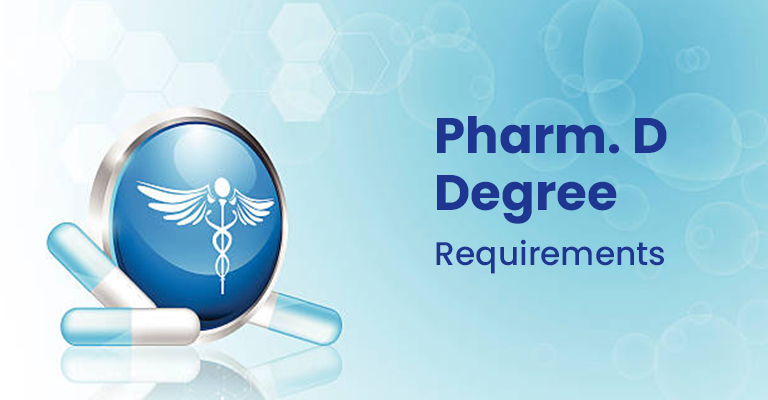
Arrange a Callback
Pharm. D degree requirements
Are you considering pursuing a PharmD degree in India? The journey to becoming a Doctor of Pharmacy (PharmD) is both satisfying and challenging. Whether you are a student eyeing a career in pharmacy or a professional looking to increase your qualifications, These usually include finishing a set of undergraduate courses, passing an admission test, and then completing the pharmd degree requirements, which involves coursework and hands-on training. This training prepares you to understand medicines, help patients use them safely, and work effectively in different healthcare settings
Additionally, if you are searching for a highly regarded D.Pharmacy College in Haryana, this guide will provide you with all the essential details.
What is a PharmD Degree?
The PharmD, or Doctor of Pharmacy, is a professional degree required for pharmacists in several countries, including India. It is designed to provide complete training and education to prepare students for pharmacy practice. This program focuses on patient care and clinical practice, ensuring graduates can manage and improve patient medication therapy outcomes.
Eligibility Criteria
To be eligible for admission into a PharmD program in India, students must meet the following criteria:
- Educational Qualifications: Students must have completed 10+2 with
- Chemistry, and Biology or Mathematics Physics. On the other hand, they can hold a Diploma in Pharmacy from a familiar institution.
- Minimum Marks: Most colleges require a minimum collective score in the qualifying exams are typically around 50%.
Understanding the Requirements for a PharmD Degree: Focus on D.Pharmacy Colleges in Haryana
If you’re considering a career in pharmacy, pursuing a Doctor of Pharmacy (PharmD) degree can be an exciting and satisfying choice. This professional degree prepares you to become a skilled pharmacist who can significantly impact patient care. For students interested in D.Pharmacy colleges in Haryana, understanding the educational background, admission process, program structure, and career opportunities can help you make an informed decision. Here’s a detailed guide to help you find the path to earning a PharmD degree.
1. Educational Background and Prerequisites
To start a PharmD program, you need to meet the exact educational requirements:
- Completion of Higher Secondary Education: The most basic requirement is to complete your higher secondary education, commonly called the 10+2 level. Your coursework should include science subjects such as Biology, Chemistry, and Physics. These subjects form the foundation for the PharmD courses, so a solid grasp of them is vital.
- Minimum Marks: Most PharmD programs need you to have achieved a minimum percentage of marks in your 10+2 exams. This percentage can vary depending on the college, but you should aim for at least 50-60%. This ensures that you have a complex academic background to handle the exact coursework of the PharmD program.
- Entrance Exams: Some D.Pharmacy colleges may require you to pass an entrance exam. These exams classically test your science knowledge and might include general ability questions. Performing well in these exams is necessary as it can power your chances of admission.
2. Admission Process
Once you meet the basic educational requirements, the next step is to find the way to the admission process, which usually involves the following:
- Application Submission: You must apply to the D.Pharmacy college of your choice. The application process typically requires submitting your academic transcripts, proof of entrance exam scores, and other applicable documents. Complete this step carefully and on time to avoid any delay.
- Entrance Examination: Depending on the college, you might need to take an entrance exam. Some colleges conduct their exams, while others might accept scores from nationwide-level exams. Preparing for these exams is vital as your performance can considerably crash your admission forecast.
- Personal Interview: Some colleges may also require a personal interview or counseling session. This is an opportunity for you to show your motivation for pursuing a PharmD degree and your understanding of the pharmacy field. Be prepared to discuss why you want to become a pharmacist and how you plan to contribute.
3. Program Structure and Curriculum
The PharmD program is designed to provide both theoretical knowledge and practical experience. Here’s a look at what you can expect from the set of courses:
- Core Courses: In the first years, you will study fundamental courses in pharmacology (the study of drugs and their effects), pharmaceutical chemistry (the science of drug design and development), pharmacognosy (the study of medicinal plants), and clinical pharmacy (the practice of pharmacy in a scientific setting). These courses lay the groundwork for more advanced topics and practical skills.
- Clinical Rotations: Hands-on clinical training is a significant part of the PharmD program. You will participate in various clinical rotations, gaining real-world experience in hospitals, clinics, and community pharmacies. These rotations help you apply your theoretical knowledge and develop practical patient care and medicine management skills.
- Research Projects: a lot of PharmD programs include a research component. You will undertake a research project under the guidance of faculty members. This project helps you build up essential thinking skills, learn about the latest advancements in pharmacy, and contribute to the field through original research.
4. Internships and Practical Experience
Practical experience is vital in the PharmD program. Here’s how it typically works:
- Hospital Internships: You will work in hospital settings where you will gain experience in different pharmacy departments, such as inpatient, outpatient, and specialty areas. This reporting helps you understand the various roles of pharmacists in other healthcare settings.
- Community Pharmacy Practice: Working in community pharmacies is also vital to your training. This experience helps you learn about the role of pharmacists in primary healthcare, including patient counseling and managing medication therapies.
5. Licensure and Certification
After completing the PharmD program, you must obtain licensure to practice as a pharmacist. The licensure process generally includes the following:
- National and State Exams: To become a licensed pharmacist, you must pass national and state-level examinations. These exams test your knowledge and ability in different aspects of pharmacy practice.
- Additional Requirements: Depending on where you plan to practice, extra requirements such as background checks or professional ethics exams may exist. Be sure to check the specific requirements for your region.
6. Career Opportunities
A PharmD degree opens up a range of career opportunities. Some of the paths you can travel around include:
- Clinical Pharmacists: You will provide medication therapy management and patient care in hospitals or clinics. Clinical pharmacists play a crucial role in ensuring the safe and effective use of medications.
- Community Pharmacists: In retail pharmacies, you will offer patient counseling, direct medication therapies, and other necessary services. Community pharmacists often serve as the first point of contact for patients seeking medical advice.
- Pharmaceutical Industry: You can work in drug development, regulatory affairs, or pharmaceutical research. This field involves contributing to creating new medications and ensuring they meet regulatory standards.
- Academia: If you enjoy teaching and research, a career in academia might be for you. You can teach pharmacy students and conduct research in educational institutions.
7. D.Pharmacy Colleges in Haryana
Haryana, located in northern India, has more than a few respected D.Pharmacy colleges offering quality education. Here’s what you can wait for from these institutions:
- Accredited Programs: Several colleges in Haryana offer accredited PharmD programs, which means they meet national educational standards and provide a high-quality education.
- State-of-the-Art Facilities: These colleges often have modern laboratories, libraries, and clinical training facilities, which improve your learning experience and help you gain practical skills.
- Experienced Faculty: Reputed faculty members with vast experience in academia and clinical practice contribute to the quality of the PharmD programs. Their expertise can provide valuable insights and guidance throughout your studies.
Structure and Duration of the PharmD Program
In India, the PharmD program is characteristically a six-year course divided into two phases:
Phase I : Iincludes five years of academic study with practical and theoretical coursework.
Phase II: This is a one-year nationality & internship program where students gain hands-on experience in clinical settings.
Some institutions also offer a PharmD program, a 3-year course for students who have already completed a Bachelor of Pharmacy (B.Pharm) degree.
Conclusion
Pursuing a PharmD degree in India is a significant step toward becoming a skilled pharmacist capable of making a real difference in patient care. To be eligible, you must complete your 10+2 education with exact subjects or hold a Diploma in Pharmacy, achieve a minimum collective score, and possibly have straightforward entrance exams. The PharmD program combines exact coursework with hands-on clinical training and research projects. For students considering D.Pharmacy colleges in Haryana, many institutions offer accredited programs with modern facilities and experienced faculty. Completing the PharmD program prepares you for diverse career opportunities in clinical practice, group of people pharmacy, the pharmaceutical industry, or academia. Overall, it’s a fulfilling path that equips you with the skills and information to excel in pharmacy.


